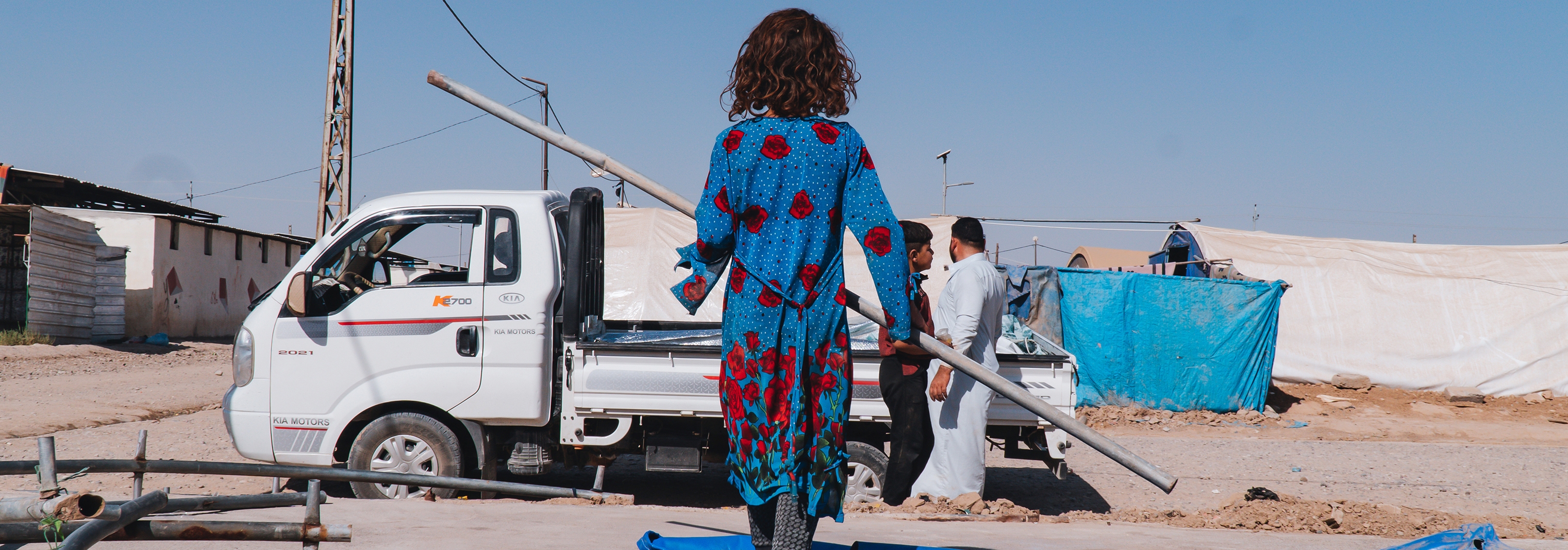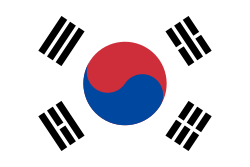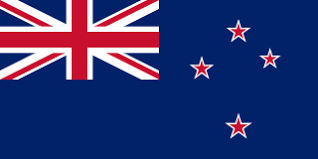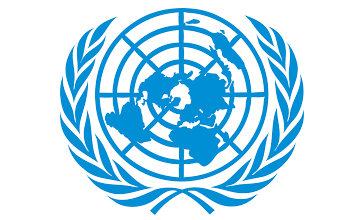IOM Vision
The Government of Iraq is supported to develop and implement inclusive strategies towards well-managed migration, as well as recovery, peacebuilding and stabilization initiatives that address root causes of displacement and support durable solutions. Migrants, displaced populations, returnees and host communities in Iraq are able to exercise their rights in an inclusive and equitable environment.
Objective
Saving lives and protecting people on the move
IOM will focus its humanitarian assistance on (1) populations who remain in displacement, including IDPs blocked from returning, unwilling or unable to return and unsuccessful returnees. The majority of IDPs in acute need will be out-of-camp, whether in informal sites, host communities or urban areas. IDPs remaining in camps will be those with severe or complex barriers to return and still in need of assistance; (2) vulnerable host communities in areas of displacement and communities of return where services are inadequate or overstretched; and (3) IDPs who have returned, but face severe conditions such as residual insecurity, damage to properties and public infrastructure, limited access to services and livelihood opportunities, and fractured social relations. IOM will maintain capacities to respond to sudden displacements caused by violent events, natural disasters or any other cause.
IOM will assist highly vulnerable households in out-of-camp locations of displacement and in areas of return with:
- Provision of Multi-purpose Cash Assistance (MPCA), in line with the principles of the Cash Working Group, to vulnerable households, to cover basic needs and reduce negative coping mechanisms. Unconditional MPCA is based on the Survival Minimum Expenditure Basket (SMEB) of a household in Iraq living near or below the poverty line, composed of expenses related to housing, food, health, transport, fuel and water.
IOM maintains its capacities for rapid intervention through:
- Provision of Emergency Cash, especially for those having multiple needs and to cope with unforeseen shocks. IOM will provide one-off cash grants for the most vulnerable households in secondary displacement affected by camp consolidation and closures or other emergency situations, and potentially those newly displaced due to an emergency event.
IOM will closely coordinate with the Government, particularly in formal camps and informal sites, to provide CCCM support to displaced populations. IOM will:
- Act as CCCM Cluster co-lead, supporting overall co-ordination and capacity development with CCCM partners and government;
- Provide site management support to government camp management actors, facilitating coordination with service providers, partners, IDP community representatives and authorities;
- Ensure direct camp management of Jeddah 5 camp;
- Provide CCCM support in Jeddah 1 camp hosting families returning from Syria;
- Set-up and strengthen governance and inclusive community participation structures in camps and out-of-camp settings, with a focus on informal sites;
- Collect, analyse and disseminate information, assess gaps, monitor protection risks and conduct service monitoring;
- Implement camp care and maintenance, and upgrade infrastructure in remaining formal camp(s) (Jeddah 5);
- Implement Mobile Camp Management in informal sites, including assessment and evaluation of living conditions, risks, gaps and needs; monitoring and coordinating service providers in the area, establishing governance structures and inclusive community consultations, implementing protection risk reduction activities and the upgrading of infrastructure;
- Provide capacity-building and coaching to the government, committees and partners;
- Enhance information sharing, coordination and referral of needs of populations in out-of-camps locations, particularly in informal sites;
- Improve the evidence base on barriers and intentions of IDPs to inform voluntary returns and durable solutions programming and referral to partners;
- Support authorities and humanitarian and transition actors to advocate for planned and principled camp closures and consolidation processes, to ensure voluntary and informed decisions by IDPs;
- Establish and run inclusive and accessible Accountability, Information, Feedback and Referral Mechanisms across all displacement sites;
- Service tracking, needs analysis, and referral to facilitate returns and durable solutions programming for protracted IDP populations.
IOM will support the provision of comprehensive primary health care (PHC) services to conflict-affected IDPs, returnees and host communities in camps, informal displacement sites and areas of return, including:
- Supporting PHC clinics in camps and out-of-camp settings, through provision of staff, medical supplies and equipment, and offering transportation services for non-emergency and emergency cases;
- Providing treatment of acute illnesses, immunization, reproductive and maternal and child health, and management of non-communicable diseases;
- Implementing health promotion activities and establishing referral system for individuals requiring specialized care, including survivors of GBV, those facing protection issues or in need of MHPSS.
IOM will continue responding to the COVID-19 pandemic through:
- Supporting the continuation of essential services at PHC facilities through COVID-19 screening and triage, referrals, capacity building on infection prevention and control, and the provision of essential medical commodities including personal protective equipment;
- Providing equipment for COVID-19 management to secondary health care facilities, supporting in the provision of COVID-19 vaccination, and increasing COVID-19 testing capacity;
- Advocating for the inclusion of migrants, populations on the move, and other vulnerable populations in COVID-19 vaccination plans and supporting vaccine deployment including cold-chain, administration, and vaccination campaigns;
- Implementing community-based surveillance activities in IDP camps and informal sites, in addition to contact tracing for COVID-19 cases.
In line with the IOM Manual on Community-MHPSS in Emergencies and Displacement, IOM will provide MHPSS to IDPs, returnees and impacted communities in camps, informal settings and return areas, with a focus on services which ensure a strengthened protection environment in the community.
Activities will focus on:
- Facilitating access to MHPSS-services and other measures, ensuring that social considerations and safety of beneficiaries are considered in service provision. Improved services mitigate and prevent negative mental health and psychosocial consequences resulting from difficult living conditions of IDPs in situations of protracted displacement and returnees living in areas with severe conditions and lack of services and opportunities;
- Strengthening family and community support for people who can maintain their mental health and psychosocial wellbeing if they receive this level of assistance. Build rapport with communities, and reach out to vulnerable persons requiring further assistance who would otherwise not have approached MHPSS-services;
- Providing focused MHPSS services (individual and group counselling) to support vulnerable IDPs, returnees, and host communities;
- Enabling service providers in direct contact with distressed individuals and families to respond to their needs in a psychosocially adequate way, by training actors in PFA;
- Providing psychiatric and clinical psychological consultations to people with pre-existing and/or emerging forms of severe stress, behavioural and relational problems, and mental disorder conditions. A quality/rights assessment will be conducted before referring persons to any psychiatric institution;
- Addressing the increasing MHPSS needs of returnees, both from displacement and abroad, who are temporarily relocating to camps or returning to areas of origin, through enhanced access to essential services and referral pathways, and capacitating local organizations to deliver assistance;
- Providing technical support to the government of Iraq to include MHPSS in its plans for supporting returnees prior to their return to the areas of origin.
IOM will provide administrative and logistical support including pre-departure and departure movement assistance to IDPs, stranded migrants and other populations in need, including due to camp closures or sudden movements due to natural or man-made events, as well as in support of displaced families seeking to access durable solution pathways. IOM will:
- Provide movement assistance through in-kind (ground transportation) or cash-based modalities, including to transport belongings;
- Facilitate the coordination with authorities, and safe and secured transportation, including providing exit letters from camps and support to coordinate security clearances, and return and post-return monitoring for safe, dignified returns;
- Provide all necessary services before and during transportation, including health screenings, monitoring of protection risks and referrals upon arrival;
- Support tracking and referral for other humanitarian assistance in areas of return.
IOM will address the needs and uphold the rights of migrants, victims of trafficking and gender-based violence (GBV), displaced persons and populations affected by conflict and other disasters, in camps, informal sites and out of camp locations, by:
- Providing specialized case management services at the individual and household levels, involving assessment and planning, referral to services, emergency cash or in-kind assistance, and follow up. This includes, but is not limited to, GBV and counter-trafficking (CT) case management services;
- Undertaking protection risk assessments and protection monitoring, including when sudden displacements or other events occur;
- Facilitating community-led discussions and identifying and strengthening referral pathways in camp and out-of-camp settings;
- Identification of protection risks and concerns through protection monitoring and community consultation, to strengthen evidence-based programming;
- Raising awareness on trafficking in persons among at-risk communities and frontline service providers, such as humanitarian actors and health workers;
In addition, IOM will work closely with frontline workers and partners to reduce protection risks by:
- Supporting a robust approach for protection from sexual exploitation and abuse (PSEA), including through collaboration with the PSEA Network, continued training to staff and partners and awareness-raising to the affected population;
- Supporting that protection is mainstreamed in all of IOM’s interventions through training of staff and partners on protection’s principles, diversity and inclusion (including the inclusion of people with disabilities as outlined in the IOM Iraq Disability Inclusion Strategy and people with diverse sexual orientation, gender identity, gender expression and sex characteristics), reviewing tools used for programming and operation, reinforcing access to community-based complaint mechanisms (CBCMs) and establishing/reinforcing safeguarding measures including the Child Safeguarding Policy;
- Addressing protection risks, including risks of GBV, through livelihood, capacity building, and other types of programming, and increasing access to information in support of safe and dignified access to services.
IOM’s Shelter and Non-Food Items (SNFI) interventions will support recent returnees and vulnerable IDPs in camps and out-of-camp settings. Assistance will target those in protracted displacement and in need of ongoing support; those who might be subjected to sudden displacement due to camp closures, natural or man-made events; and vulnerable returnees living in severe conditions.
When it comes to shelter activities, IOM will focus on:
- Acting as co-lead of the Sub-National Central/South Shelter Cluster, working with local and national partners on an adequate coverage of governorates for emergency preparedness and response support in terms of shelter and NFI needs;
- Providing critical shelter upgrades where IDPs are displaced in unfinished transitional locations or locations not intended to serve as shelters, such as public buildings, schools, mosques and other makeshift shelters. The shelter response will aim at significantly improving safety, security and privacy for improved and dignified living conditions for the families;
- Providing Sealing Off Kits (SOKs), either through in-kind or cash/vouchers, to provide families with an essential package of items to seal their living space as quick relief, short term shelter solutions.
When it comes to NFI assistance, IOM will focus on:
- Providing basic NFI kits to cover essential NFI needs through in-kind assistance, unconditional restricted cash and vouchers. This will be directed at vulnerable displaced and returnee households living in informal settlements or out of camp locations as a one-off support;
- Providing replacement items targeting the IDP households who have received NFI assistance in the past, but require additional support to replace used, damaged, lost items, or items that they were not able to bring with them during secondary displacement as the displacement continues;
- Maintaining a contingency stock of NFI items to rapidly respond to needs arising from sudden natural or man-made events.
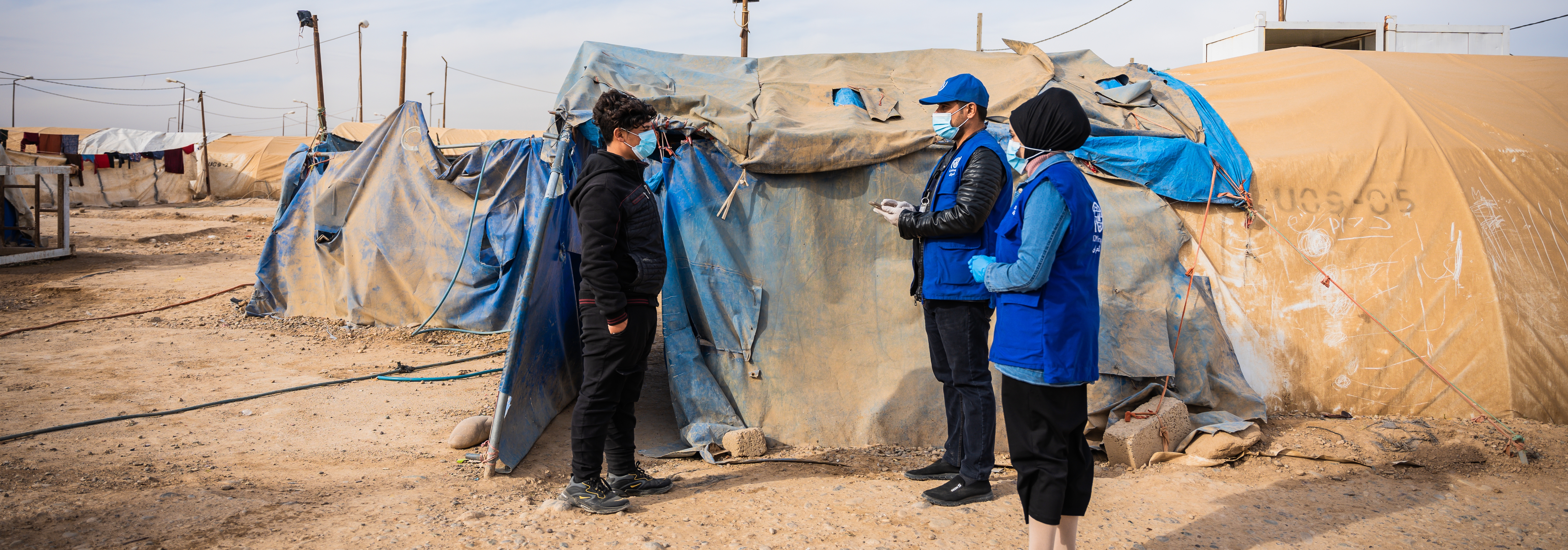
Objective
Driving solutions to displacement
IOM will maintain and scale-up its assistance to populations in protracted displacement and communities of return and relocation to address key barriers to return, social cohesion and recovery. IOM will operate under the Iraq Durable Solutions framework to identify the causes of displacement and propose adapted interventions, in collaboration with the Government and partners. IOM will: (1) assist IDPs still displaced, whether in camps, informal sites or other out-of-camp settings, to better assess their situation and support safe and sustainable voluntary returns, or relocation, when the environment is conducive; (2) support returnees and communities in areas of return to access basic services, livelihoods, shelter and community infrastructure; (3) work closely with communities and authorities to improve safety and security, social cohesion and facilitate reintegration; (4) provide assistance to survivors of human rights violations; (5) contribute to capacity-development of government authorities, CSOs and NGOs to facilitate community stabilization support; and (6) improve the availability of and access to quality health services in urban areas with large populations of IDPs, and in areas of return.
IOM’s community stabilization and recovery programming seeks to address drivers of instability at the community level, establishing the foundation for longer-term recovery and preventing further forced migration. The programme comprises the restoration of basic rights, helping vulnerable populations to access public services and promoting inclusivity of public services, promoting non-violent resolution of conflicts, and facilitating safe and durable (re)integration – through:
- Strengthening government capacities to perform core functions and bringing relevant government entities together with communities in a way that increases participatory decision-making, strengthens mutual trust, and builds accountability;
- Promoting social cohesion and enabling communities to manage local conflicts and promote a culture of peace, especially through empowering youth to participate in the society in a productive, constructive and peaceful manner, and fostering community reconciliation;
- Promoting non-violent political processes, civic education, social policy development, and supporting inclusive economic recovery;
- Increasing confidence in public institutions through measures to improve community safety and civic engagement;
- Increasing access to basic public services, and supporting people in need of social protection, through direct support (transportation, accompaniment, interpretation, etc.) to access social welfare entitlements;
- Increasing access to livelihoods through cash-for-work and vocational training, to ensure income for vulnerable households;
- Capacitating state and local governance, and promoting non-violent political processes, civic education, and social policy development;
- Supporting research and assessments examining the efficacity of social cohesion programming, including the relevance of contact theory to facilitating inter-ethnic and -sectarian relations in regions with levels of social tensions.
In partnership with the GoI, IOM will contribute to addressing the main barriers to safe and sustainable returns and support IDPs and returnees in achieving durable solutions. In line with the Progressive Resolution of Displacement Situations (PRDS) Framework, IOM's durable solutions strategy aims at providing means to IDPs to sustainably resolve their displacement and thrive in their community of return or relocation. IOM will assist IDPs, returnees and households in areas of return or relocation through:
- Co-leading the Durable Solutions Task Force (with UNDP); as well as chairing the Return Working Group (RWG); and co-leading three of the area-based coordination (ABC) groups and sitting on all other ABC groups;
- Improved access to safe, dignified and sustainable housing through shelter rehabilitation and supporting HLP issues;
- Facilitated access to services, through the rehabilitation of key community infrastructure, including roads, markets, electricity grids and water networks, public buildings, health centres, schools or any other project benefiting both the community and helping to resume economic activity;
- Increased sustainable livelihood opportunities, including through vocational, on-the-job and business trainings, and support to businesses that were successful before the conflict and those which show potential for job creation through IOM Iraq’s Enterprise Development Fund (EDF);
- Reintegration services to respond to the needs of returnees, IDPs and affected communities to support recovery and stabilization approaches by linking affected communities with humanitarian and recovery services;
- Support for facilitating returns, adhering to international human rights law related to the treatment of perceived affiliates of ISIL, in addition to supporting activities for understanding and resolving the causes of displacement, including research, strategy and policy development;
- Support for thematic research, reports and factsheets on durable solutions, protracted displacements and sustainability of returns, and the impact of disasters such as the COVID-19 pandemic on economic recovery, among others
- Supporting advocacy efforts on durable solutions beyond return including local integration and settlement in third locations, in line with the IASC Framework on Durable Solutions and IOM’s PRDS Framework.
IOM will support the government to strengthen the health system in Iraq, through:
- Improving quality of care at the primary health care level through capacity building of health workers on medical and non-medical topics (people centered care, code of conduct, conflict sensitivity, etc) and supportive supervision;
- Rehabilitation of health facilities and provision of essential equipment and supplies to primary and secondary health care facilities;
- Implementing health promotion interventions designed to improve social cohesion in conflict-affected areas and areas of return, initiate community-based health projects including community health services, and improve referral systems;
- Supporting the National Tuberculosis Program to reduce TB transmission in Iraq through improved detection and treatment of TB cases, including contact and defaulter tracing;
- Strengthening disease surveillance at community and health facility levels and supporting the implementation of events-based surveillance at the sub-national level, training, and the use of electronic reporting systems;
- Supporting the adoption and roll-out of the District Health Information System (DHIS 2) through the provision of equipment, training, and technical support;
- Conducting multi-layered health assessments and research on community needs and perceptions of the health system (availability and quality of care, adapted services, dignified health services) to better understand these perceptions and needs, and design adapted interventions.
IOM will implement MHPSS activities and support at the individual, family and community levels, contributing to wider efforts to mend social fabrics and strengthen social cohesion in post-conflict Iraq. IOM will:
- Design and conduct trainings and provide comprehensive support to facilitate the integration of MHPSS in conflict transformation and mediation;
- Focus on the integration of MHPSS in livelihoods and development programmes, with IOM's Manual on Community-based Mental Health and Psychosocial Support in Displacement and Emergencies as guiding principles;
- Conduct and publish extensive IOM research supporting positive, mutually reinforcing linkages between MHPSS and livelihoods, and MHPSS and mediation programming.
IOM will contribute to strengthening the national laboratory system, complementing interventions previously conducted, through:
- Establishing and supporting laboratories to enable prompt identification and reporting of priority pathogens;
- Providing technical assistance and capacity building to ensure quality standards are met, including for biosafety;
- Contributing to improving sample collection and transport systems.
IOM will continue to integrate peacebuilding and peace promotion activities into programming, notably through:
- Supporting government efforts to promote stability in areas that are struggling to absorb individuals who spontaneously disengaged from armed groups following the military defeat of ISIL and require assistance to transition back to civilian life;
- In ‘liberated’ areas, supporting families with a perceived affiliation to extremist groups to access durable solutions, including through support which enables them to return to and reconcile with communities in areas of origin;
- Bolstering community resilience to future waves of violent extremism through Preventing Violent Extremism (PVE) programming, aligned with the National Strategy to Combat Violent Extremism Conducive to Terrorism and implemented in close cooperation with the government;
- Supporting research into the causes and consequences of displacement of former combatants and persons with perceived affiliation and methods to facilitate their reintegration into society.
Building on progress realized in Iraq at policy level, IOM will:
- Keep supporting the GoI in implementing and operationalizing reparation laws (notably the Yazidi Survivors Law) in Iraq;
- Run capacity-building workshops for government officials from the Federal Government of Iraq, the Kurdistan Region of Iraq, and for CSOs and NGOs;
- Advocate for the right to reparations through awareness-raising programming and information campaigns, including policy guidance, expert advice and technical support to governments and local and international stakeholders to promote the transparent delivery of individual or collective reparations measures.
IOM will address challenges related to housing, land and property (HLP) issues, including lost or destroyed official papers, occupied houses or other general need for legal assistance, to remove barriers to return, improve access to public services and support conditions that enable durable solutions. To complement the other interventions in facilitating safe, dignified and sustainable return and reintegration, IOM will:
- Provide assistance to beneficiaries alongside housing-related interventions. Support includes both representation and information counselling and can be provided either through existing joint community-resource centres or in other forms, adapted to the context and available administrative services;
- Provide assistance to obtain civil documentation, focused on IDPs for which official papers were lost or destroyed during the conflict, members of household with perceived affiliation, and children born under ISIL occupation;
- Build the capacity of CSOs and government partners, including through the provision of policy guidance, expert advice; and technical assistance for HLP rights, including, but not limited to, restitution;
- Contribute to the work of DSTWG sub-group on HLP.
Objective
Strengthen preparedness and reduce disaster risk
IOM will support the government, including national and local authorities, and selected CSOs and community leaders through trainings and technical assistance to support disaster management and manage risks. This includes: (1) supporting the GoI to improve preparedness plans and coordination with stakeholders; (2) providing technical assistance to enforce appropriate health regulations and strengthen health systems; and (3) reinforcing capacities in providing adapted MHPSS services to prevent or mitigate impacts of disasters, including through additional support to local actors; and (5) engaging communities in phase-out and ownership, building civil society capacity. IOM will support efforts to include and mainstream preparedness and risk reduction for new crises in ongoing and planned efforts of government and non-governmental actors.
IOM Iraq will work to cover the need for a systematic evidence base in southern and central Iraq by focusing on the nexus between climate change, urban fragility, conflict and displacement. IOM will:
- Design and conduct specific analyses around the potential and impact of environmental degradation on livelihoods, social cohesion, conflict and displacement;
- Collect and analyse data, and publish datasets and documentation to inform future programming related to natural disaster prevention in targeted areas.
IOM will keep supporting government authorities and CSOs to build their capacities for disaster preparedness and response in line with humanitarian principles. IOM will:
- Conduct comprehensive needs assessments for capacity-building of key stakeholders in charge of responding to impacts of disasters, such as national and local authorities, civil society organizations and community leaders;
- Implement trainings and technical assistance to better equip those actors to include principled emergency preparedness and response to better anticipate and face future displacement whether due to conflict or natural disasters, including contingency planning, information management and coordination, logistics and warehousing, service mapping and emergency coordination with national and international actors;
- Continue developing contingency planning, with all stakeholders involved and in synergy with its other programmes, to be prepared to support households leaving camp settings through multi-sectoral assistance, including emergency cash and NFI, social cohesion and reintegration, access to services and referral for targeted assistance;
- Build on the Mass Evacuation in Natural Disasters (MEND) training conducted for GoI officials in 2021 to support them to develop governorate level SOPs on DRR to equip local authorities and key community stakeholders to develop community-level contingency plans as well as of running simulation exercises;
- Maintain operational capacities and procedures to rapidly intervene in case of displacements due to sudden events such as natural disasters or violent conflict;
- Build capacity of government counterparts in taking over emergency preparedness strategies and coordinating with DS area-based coordination partners.
IOM will support the GoI in meeting the requirements of the International Health Regulations (2005) in line with the results of the Joint External Evaluation and through supporting the implementation of the National Action Plan for Health Security by:
- Conducting sensitization workshops, as a first step to raise awareness on the importance of implementing International Health Regulations core components for country preparedness and understand needs for capacity-building on specific issues;
- Developing training curricula on emergency preparedness, response, and recovery for regional and sub-national health authorities;
- Assessing the capacities and barriers for health system emergency preparedness and response at the local level;
- Scaling-up implementation of community-based surveillance to vulnerable outbreak prone locations and strengthening local disease surveillance systems.
IOM will contribute to strengthening public health capacities at PoEs through:
- Assessments of International Health Regulations core capacities at PoEs;
- Developing standard operating procedures for the detection and management of public health events at PoEs, expanding beyond COVID-19.
IOM will work on strengthening the services offered to people facing protracted displacement, new displacements and returns, to support their mental health, and prevent neurological and substance use disorders, among others. IOM's MHPSS Programme will:
- Support, through its role as chair of the national Working Committee on Capacity Building and HR Management, different service providers to develop a more practical and sustainable framework for capacity building and supervision of local human resources in the field of MHPSS at different layers of interventions (including for psychologists, social workers, and community mobilizers). Activities will be guided by IOM's Manual on Community-Based Mental Health and Psychosocial Support in Emergencies and Displacement;
- Contribute to supporting the health system capacity to respond to the long-term mental health and psychosocial impacts of the COVID-19 pandemic and, in general, to MHPSS needs among populations affected by displacement, including through the provision of resources (such as medical supplies and psychotropic medicines) and training by expert medical professionals;
- Support the government in the operationalization of the National Suicide prevention strategy and in developing concrete plans for its implementation;
- Support the professional mental health associations and similar entities to improve the standards of care provided through training, capacity building, supervision and providing platforms for exchange of experience to benefit from international expertise and standards in MHPSS, such as diaspora mobilisation;
- Development of assessments and research into the mental health and psychosocial consequences of climate change and extreme weather conditions in Iraq, providing recommendations for risk mitigation.
IOM will address the challenge of water scarcity in the context of climate change to reduce the risk of water issue-induced displacement among populations in Iraq, as the risk remains high due to lack of water or bad quality water resources. IOM will:
- Identify critical infrastructural needs and provide rehabilitation support to facilities such as (but not limited to) water treatment plants, reverse osmosis (RO) stations and water and irrigation systems;
- Conduct research to better understand the water dynamics in the southern and central parts of Iraq and build the capacity of the government in water-related policies;
- Provide tailored livelihoods support to individuals affected by water scarcity through vocational training, on-the-job training, and support to targeted micro-enterprises.
- Continue rehabilitation of water treatment facilities to provide clean water, and implement maintenance program in coordination with the GoI for the sustainability of operation and maintenance;
Objective
Contribute to an evidence-based and efficient crisis response system
IOM will maintain capacities to collect humanitarian data, track IDP and other migrants’ movements and produce high-quality reports benefitting humanitarian and non-humanitarian actors in Iraq. IOM will support research and assessments on needs in locations of secondary displacement and informal sites; in locations of integration or reintegration; on climate-induced displacement, and other key issues related to displacement in Iraq. Data and related products developed by IOM will support the capacities of stakeholders in providing better targeted, evidence-based responses to IDPs and returnees.
IOM remains one of the main providers of reliable data on displacement and returns in Iraq, assessing intentions and barriers to return, and providing an overview on the severity of conditions in areas of return and displacement. IOM will continue to:
- Collect data through IOM’s Rapid Assessment and Response Teams (RARTs), using 80 staff deployed across Iraq, and interviews with our key informants utilizing a large well-established network of over 9,500 informants that includes community leaders, mukhtars, local authorities and security forces;
- Disseminate disaggregated information and thematic reports on the number of IDPs and returnees at the governorate, district, subdistrict and location levels, their shelter type, the period of displacement, areas of origin for IDPs, areas of last displacement for returnees, assess their intentions and barriers to return, and give an overview on the severity of conditions in areas of return, among other, for improved programming;
- Produce data on migration movements with neighbouring countries;
- Track mobility restrictions and health measures implemented to curb the spread of COVID-19, and update and maintain a COVID-19 dashboard;
- Produce and disseminate products through the online platform and through sharing with partners, including: IDP and Returnee master lists, providing raw information on displacement and mobility; Return Index, providing key information and analysis on conditions of return; IDP Index, providing key information and analysis on conditions of displacement; Integrated Location Assessments, providing an in-depth look into IDPs and returnees, focusing on profiling the locations in which these groups live;
- Produce ad hoc Emergency Tracking reports, providing timely data on the number of individuals displaced due to emerging crises such as drought, flood, closures of camps.
Iraq
The map used here is for illustration purposes only. Names and boundaries do not imply official endorsement or acceptance by IOM.
Figures are as of 31 December 2023. For more details of IOM's operational capacity in country, please see the IOM Capacity section.

